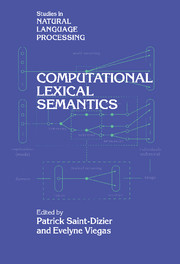Book contents
- Frontmatter
- Contents
- List of contributors
- Preface
- 1 An introduction to lexical semantics from a linguistic and a psycholinguistic perspective
- Part I Psycholinguistics for lexical semantics
- Part II Foundational issues in lexical semantics
- 4 Linguistic constraints on type coercion
- 5 From lexical semantics to text analysis
- 6 Lexical functions, generative lexicons and the world
- 7 Semantic features in a generic lexicon
- Part III Lexical databases
- Part IV Lexical semantics and artificial intelligence
- Part V Applications
- Part VI Computer models for lexical semantics
- Author index
- Subject index
4 - Linguistic constraints on type coercion
Published online by Cambridge University Press: 29 September 2009
- Frontmatter
- Contents
- List of contributors
- Preface
- 1 An introduction to lexical semantics from a linguistic and a psycholinguistic perspective
- Part I Psycholinguistics for lexical semantics
- Part II Foundational issues in lexical semantics
- 4 Linguistic constraints on type coercion
- 5 From lexical semantics to text analysis
- 6 Lexical functions, generative lexicons and the world
- 7 Semantic features in a generic lexicon
- Part III Lexical databases
- Part IV Lexical semantics and artificial intelligence
- Part V Applications
- Part VI Computer models for lexical semantics
- Author index
- Subject index
Summary
Degrees of polymorphism
In order to help characterize the expressive power of natural languages in terms of semantic expressiveness, it is natural to think in terms of semantic systems with increasing functional power. Furthermore, a natural way of capturing this might be in terms of the type system which the grammar refers to for its interpretation. What I would like to discuss in this chapter is a method for describing how semantic systems fall on a hierarchy of increasing expressiveness and richness of descriptive power and investigate various phenomena in natural language that indicate (1) that we need a certain amount of expressiveness that we have not considered before in our semantics, but also (2) that by looking at the data it becomes clear that we need natural constraints on the mechanisms which give us such expressive systems. After reviewing the range of semantic types from monomorphic languages to unrestricted polymorphic languages, I would like to argue that we should aim for a model which permits only a restricted amount of polymorphic behavior. I will characterize this class of languages as semi-polymorphic.
I will outline what kind of semantic system produces just this class of languages. I will argue that something like the generative lexicon framework is necessary to capture the richness of type shifting and sense extension phenomena.
Let me begin the discussion on expressiveness by reviewing how this same issue was played out in the realm of syntactic frameworks in the 1950s.
- Type
- Chapter
- Information
- Computational Lexical Semantics , pp. 71 - 97Publisher: Cambridge University PressPrint publication year: 1995
- 6
- Cited by

